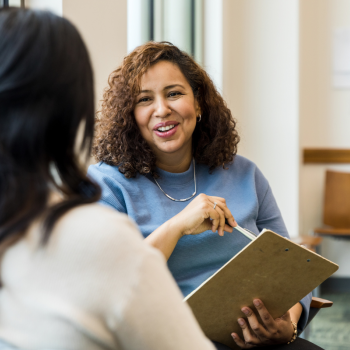September is Recovery Month: PLA Supports People in Recovery

September is Recovery Month. Philadelphia has been severely impacted by the opioid crisis, with one of the highest rates of death from drug overdoses among the nation’s largest cities. In 2019, as a response to the epidemic, Philadelphia Legal Assistance’s (PLA) Medical Legal Community Partnership (MLCP) became one of only a few medical-legal partnerships in the country that strategically partnered with health centers offering Medication Assisted Treatment (MAT) to support patients suffering from opioid use disorder (OUD).
PLA partners with two community health centers to implement our MAT-MLCPs - Delaware Valley Community Health (DVCH) and Esperanza Health Center (EHC). Our program is built on collaboration, so MLCP advocates and healthcare providers work together to identify patients’ health-harming needs that have a negative impact on a patient’s recovery and can be addressed through the provision of civil legal aid. We share a collective goal with our MAT partners to serve justice-involved patients in recovery, reduce the stigma around OUD, and alleviate the effects of discrimination that our patients often face due to their addiction.
Recovering from addiction is a complex experience that requires medical and emotional support. Legal assistance also helps patients in recovery overcome barriers that hinder the recovery process. Philadelphia Legal Assistance’s (PLA) Medical Legal Community Partnership (MLCP) plays a crucial role in helping individuals in recovery receiving Medication Assisted Treatment (MAT) navigate various legal challenges. By providing free legal services to these MAT patients, our MLCP ensures that those in recovery have the support they need to rebuild their lives and maintain stability.
One significant way civil legal aid helps people in recovery is by addressing housing issues. Stable housing is a foundational element of successful recovery, but many individuals face eviction or denial of housing due to past legal issues or ongoing discrimination for being in recovery. PLA offers legal assistance and advice to prevent evictions, secure housing rights, and advocate for fair treatment, thereby providing a stable environment essential for recovery.
Family law issues, such as child custody or support, are often major concerns for those in recovery. Legal challenges in these areas can add stress and potentially derail the recovery process, leading to relapse. PLA provides legal advice and representation to help individuals navigate these complex issues, ensuring that they can maintain family connections and fulfill their legal obligations without compromising their recovery efforts.
Finally, civil legal aid organizations like PLA contribute to the recovery process by helping individuals access public benefits and health insurance. These benefits include SSI/SSDI, SNAP, Medicaid and Medicare, LIHEAP assistance, and more. By assisting with applications and appeals, PLA ensures that clients receive the financial and medical support they need to focus on their health and recovery. For example, a client was referred to the MLCP through the Medically Assisted Treatment program. They had been living with a disability and no source of income. They were constantly moving from recovery homes to friends' places, desperately looking for a stable place to stay. After much advocacy from one of our MLCP attorneys, the client was ultimately approved for SSDI at $1434/mo and will recover over $22,000 in back pay. With this significant lump sum payment, the client was finally able to afford an apartment of his own. Achieving this stability has been crucial to significantly improving his ability to recover from opioid use disorder.
Civil legal aid is an invaluable resource for individuals in recovery. Our MLCP provides essential support by addressing legal challenges related to housing, employment, family law, and public benefits. By alleviating these legal burdens, PLA helps individuals in recovery build stable, productive lives and supports their journey toward long-term recovery.

